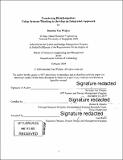Countering disinformation : using systems thinking to develop an integrated approach
Author(s)
Tan, Brendan Weijian.
Download1342108937-MIT.pdf (22.83Mb)
Other Contributors
Massachusetts Institute of Technology. Engineering Systems Division.
System Design and Management Program.
Terms of use
Metadata
Show full item recordAbstract
Although disinformation has been used by malicious actors throughout the ages, technological advances and social changes in the Internet era have made it a more potent problem than ever before. Several key elections in 2016 were heavily influenced by disinformation -- including the Brexit referendum and US presidential elections -- which made it evident that information is increasingly being used as a weapon. Fittingly, the Center for European Policy Analysis has highlighted that the "age of information is fast becoming the age of disinformation". Although disinformation campaigns can have a significant impact on the population, the manpower and costs required to carry them out are disproportionately low. It is thus imperative that nations are adequately prepared to deal with this asymmetric and dangerous threat using a suite of countermeasures, as there is no one silver bullet to tackle this problem. Countermeasures that have been proposed or implemented around the globe are analyzed, and a systems thinking methodology is used to develop an integrated approach to deal with this complex issue at the national-level. To guide the entire thought process, the ARchitecting Innovative Enterprise Strategy (ARIES) framework is utilized. Finally, a case study on the annexation of Crimea by Russia serves to qualitatively validate the proposed system and ascertain its applicability in a real scenario. This particular case study is chosen as it is a prime example of how disinformation can be a powerful tool in the hands of adversaries.
Description
Thesis: S.M. in Engineering and Management, Massachusetts Institute of Technology, Engineering Systems Division, System Design and Management Program, 2020 Cataloged from PDF version of thesis. Page 126 blank. Includes bibliographical references (pages 101-119).
Date issued
2020Department
Massachusetts Institute of Technology. Engineering Systems Division; System Design and Management Program.Publisher
Massachusetts Institute of Technology
Keywords
Engineering Systems Division., System Design and Management Program.